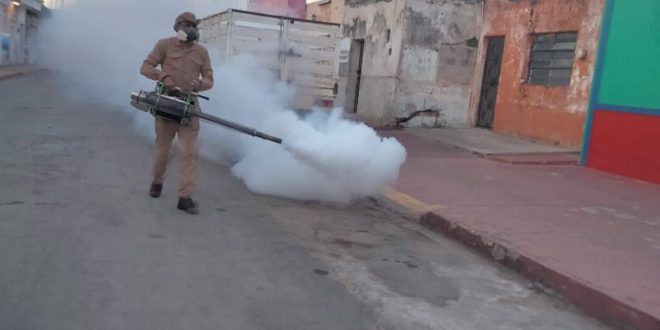The state agency reported that this prevention initiative will be carried out in various neighborhoods of the Yucatecan capital, as well as in municipalities and police stations in the east and south of the state.
A careful call is made to avoid continuing to take out garbage and junk on the corners since the junk removal campaign concluded in recent days and to avoid health inconvenience to the population.
The Ministry of Health of Yucatán (SSY) reported that it continues with the permanent fumigation work, so from July 15 to 19, these actions will be carried out in several neighborhoods of Mérida, as well as in municipalities and police stations in the east and the south of the state, as part of the prevention measures against the mosquito that transmits dengue, Zika, and chikungunya.
The director of Prevention and Health Protection of the SSY, Carlos Isaac Hernández Fuentes, explained that the weekly fumigation schedule will be distributed as follows: on Monday, July 15 in Mérida, the Brisas neighborhoods of San José, Nueva San José Tecoh, San Antonio belonging to Oxkutzcab.
Likewise, the state official added that for Tuesday the 16th in the Yucatecan capital, Jardines del Roble, El Roble Agrícola, as well as San Arturo Xluch will be attended to and in the interior of the state the actions will be carried out in Akil, Chichimilá, Espita and Valladolid.
For Wednesday, July 17, in Mérida El Roble I and II, Manuel Crescencio Rejón and San Marcos Nocoh will be covered, as well as Calcehtok, Opichén police station, Peto, Tixcacalcupul and Uxmal Santa Elena police station.
On Thursday the 18th in the Yucatecan capital, work will be carried out on Ciudad Industrial, Graciano Ricalde, Libertad, Opichén, Sac-Nicté, and Villas Mérida, for the interior of the state activities will be carried out in Peto and Pisté Tinum police station.
Finally, on Friday, July 19, in Mérida, fumigation will be carried out in the areas of Ampliación Tixcacal Opichén, Paseos de Opichén, Valparaíso, Villa Magna, and in the interior of the state the municipality of Chemax will be attended to.
Hernández Fuentes invited the population to collaborate by keeping their yards clean and eliminating containers where water can accumulate, complementary measures to prevent the proliferation of the mosquito that transmits dengue, Zika, and Chikungunya.
The state official called to avoid continuing to take garbage and junk to the corners to avoid health inconvenience to the population since the junk removal campaign concluded in recent days and currently an extraordinary effort is being made in coordination with authorities of the City Council of Mérida for the collection of remnants.
The director of Prevention and Health Protection of the SSY pointed out that so far this year a series of actions have been carried out for the benefit of the population that consists of larval control of a total of 242,570 homes, fogging of 12,548 hectares of surface with fumigation vehicles and 4,978 houses fumigated.
Hernández Fuentes explained that dengue is a tropical disease transmitted by the Aedes aegypti mosquito, which lays its eggs in containers with stagnant water, such as buckets, tires, pots and water tanks, so he recommended that the population take this factor into consideration because Rainwater encourages the insect to lay its eggs in vases, pots, containers and useless objects in patios where mosquitoes capable of transmitting the disease breed.
It should be noted that there are four types of dengue viruses, which means that a person can contract the disease up to four times in their life. In Yucatán, types 1 and 2 are the most common, but the entry of serotype 3 increases the risk of contagion.
In this sense, it is emphasized that prevention is key, since the responsibility to avoid these actions is shared and this disease can be avoided by using repellent, keeping yards clean to eliminate mosquito breeding places, installing mosquito nets and following campaigns. governments for the benefit of the population.
To conclude, Hernández Fuentes said that it is important to consider that factors such as climate and individual immune response can influence the risk of getting sick, so prevention and community cooperation are essential to combat dengue.


